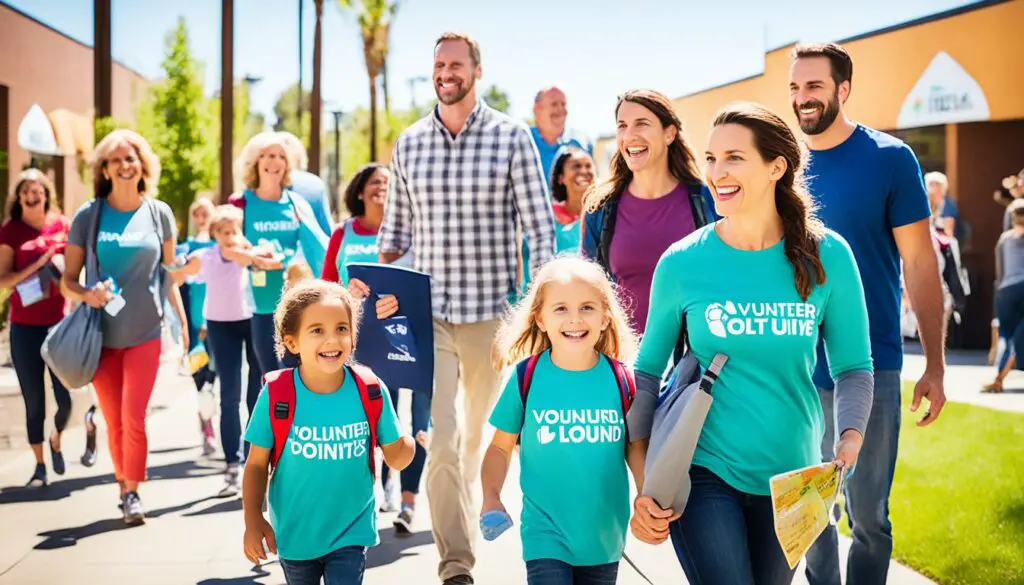Giving Back Together: Exploring Family Volunteer Opportunities
As a parent, I believe that teaching my children the importance of giving back to the community is one of the most valuable lessons I can impart. That’s why I’ve discovered the power of family volunteer opportunities, which allow us to make a positive impact while creating enriching experiences for our family.
Family volunteer opportunities provide a unique and rewarding way for families to come together and contribute to their communities. By engaging in volunteer work as a family, we can instill the values of empathy, compassion, and civic responsibility in our children, while also creating lasting memories and strengthening our family bonds.
Key Takeaways:
- Family volunteer opportunities have a positive impact on both the community and the family itself.
- Engaging in volunteer work as a family teaches empathy, compassion, and civic responsibility.
- Family volunteering creates meaningful memories and strengthens family bonds.
- Research shows that family volunteering can enhance children’s social and emotional development.
- There are various ways to find family volunteer opportunities, both locally and internationally.
Why Engage in Family Volunteering?
Engaging in family volunteering offers a multitude of benefits for both children and adults. It serves as an opportunity to teach children important values such as empathy, compassion, and gratitude, instilling in them a sense of social responsibility and empathy towards others. By actively participating in volunteer work as a family, parents can foster a deep understanding of the importance of giving back to the community in their children.
Moreover, family volunteering provides a chance for parents to spend quality time with their children, away from the distractions and busyness of everyday life. By dedicating time to volunteer as a family, parents can create meaningful memories and strengthen the bonds within the family unit. These shared experiences can lead to a stronger sense of connection and a deeper appreciation for one another.
Research has also shown that family volunteering positively impacts children’s social and emotional development. Engaging in volunteer work from a young age enhances self-esteem, promotes positive communication skills, and fosters a sense of purpose. Through volunteering, children learn how to collaborate with others, develop teamwork skills, and gain a broader perspective on the world around them.
“Family volunteering promotes the values of empathy, compassion, and gratitude, while forging lasting memories and strengthening family bonds.”
By actively engaging in family volunteering, parents have the opportunity to guide their children towards becoming caring and compassionate individuals, ready to make a positive impact in the world. The shared experience of giving back as a family not only benefits the communities and causes being served but also plays a vital role in shaping the character and values of future generations.

| Benefits of Family Volunteering |
|---|
| Teaches empathy, compassion, and gratitude |
| Creates meaningful memories and strengthens family bonds |
| Enhances children’s social and emotional development |
Finding Family Volunteer Opportunities
When it comes to finding family volunteer opportunities, there are a few avenues you can explore. One option is to reach out to local nonprofit organizations or community centers in your area. These organizations often have information about volunteer opportunities that are suitable for families and can guide you in the right direction. By connecting with local organizations, you can get involved in family-friendly volunteer events such as community clean-ups, food drives, or working at local animal shelters.
Another option to consider is exploring international volunteer trips specifically designed for families. These trips offer a unique opportunity to engage in meaningful volunteer work while immersing yourself in a different culture. From building houses in underprivileged communities to participating in wildlife conservation efforts, there are various projects that families can participate in together. By embarking on an international volunteer trip, you not only contribute to a worthy cause but also create lasting memories and broaden your children’s horizons.
When searching for volunteer opportunities, it is crucial to consider the age appropriateness of the activities. Involving your children in the decision-making process can ensure their engagement and interest. This way, you can choose volunteer projects that align with their skills, interests, and capabilities. Whether it’s engaging in a hands-on activity or utilizing their talents, finding age-appropriate volunteer work can make the experience more meaningful for your entire family.

By taking the time to find the right family volunteer opportunities, you can embark on a rewarding journey that not only benefits your community but also strengthens family bonds and teaches important values. Whether it’s getting involved locally or exploring international ventures, the act of giving back together can have a profound impact on both your family and the world around you.
Making the Most of Family Volunteer Opportunities
To make the most of family volunteer opportunities, it is important to engage in reflection and discussion as a family. After each volunteer experience, take the time to discuss the impact of the work done, the challenges faced, and the lessons learned. This reflection can help reinforce the values and lessons learned during the volunteer experience and encourage ongoing commitment to giving back as a family.
By actively reflecting on the volunteer work, families can deepen their understanding of the issues they’re passionate about and identify ways to improve their impact. It’s essential to have open and honest conversations about the experiences, allowing each family member to share their thoughts and emotions. This not only enhances communication skills but also fosters empathy and understanding among family members.
In addition to reflection, maintaining an ongoing commitment is key. Volunteering should become a regular part of family life, integrated into daily routines and schedules. The key is to find a balance that works for your family. Consider the time, energy, and resources you can dedicate to volunteering while also prioritizing other family activities and responsibilities.
By finding this balance, families can ensure that volunteering becomes a sustainable and enriching experience that strengthens family bonds and positively impacts the community. It allows for quality time together while making a difference. So, let’s reflect, discuss, and find the balance that allows us to make a lasting positive contribution.
FAQ
What are family volunteer opportunities?
Family volunteer opportunities are activities or projects that allow families to come together and make a positive impact in their communities through volunteer work.
Why is family volunteering important?
Family volunteering is important because it teaches children important values such as empathy, compassion, and gratitude, while also allowing parents to spend quality time with their children and create meaningful memories together.
How can I find family volunteer opportunities?
There are various ways to find family volunteer opportunities. You can reach out to local nonprofit organizations or community centers to inquire about suitable volunteer opportunities. Another option is to explore international volunteer trips specifically designed for families.
What types of volunteer work are suitable for families?
Many organizations offer family-friendly volunteer events such as community clean-ups, food drives, or working at local animal shelters. It is important to consider the age appropriateness of the activities and involve children in the decision-making process.
How can I make the most of family volunteer opportunities?
To make the most of family volunteer opportunities, engage in reflection and discussion as a family after each volunteer experience. This reflection can help reinforce the values and lessons learned. It is also important to find a balance between volunteer work and other family activities.






